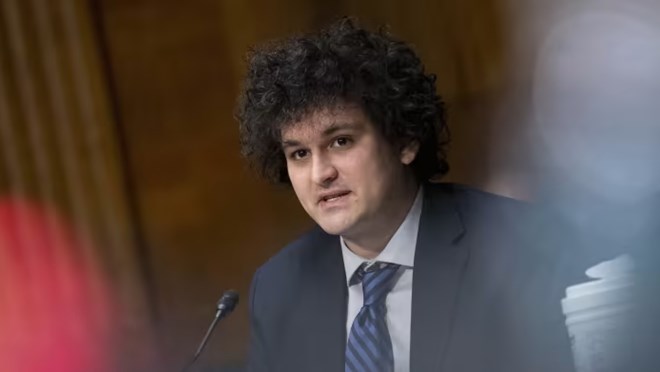
Stefania Palma in Washington and Scott Chipolina in London
Friday November 11, 2022

Sam Bankman-Fried of FTX testifying before a Senate committee in February © Bloomberg
In less than four years, Sam Bankman-Fried rose from founding crypto exchange FTX to becoming the industry’s tousled de facto spokesman in Washington. In less than a week, crypto’s politician whisperer has witnessed the collapse of his empire and the evaporation of his influence on Capitol Hill.
Bankman-Fried’s FTX — and sister trading firm Alameda Research — were until this week considered a rare oasis of stability in an otherwise teetering crypto market. In a summer of market turmoil the chief colloquially known as “SBF” built stature by coming to the aid of flailing crypto companies such as lending platform BlockFi.
But this week a liquidity crisis enveloped Bankman-Fried’s own companies, leading the chief executive of arch-rival Binance to announce his exchange was set to acquire FTX.com. The deal — which was subject to due diligence — disintegrated a day later. Bankman-Fried desperately searched for a saviour as regulatory probes swirled around his businesses.
In Washington, Bankman-Fried had testified before powerful congressional committees, publicly supported crypto legislation and become a major political donor. The fall of crypto’s most prominent American spokesman would affect more than just FTX; it could make things harder for an industry that for years has raised the ire of policymakers.
“If you’re not at the table, you’re on the menu,” said Charley Cooper, managing director at R3, a blockchain firm. “I would suggest that members of the crypto community who realise how bad this looks for the industry should be going out of their way to engage with policymakers.”
Crypto executives fear FTX’s troubles will intensify scrutiny. Perianne Boring, founder and chief executive of crypto lobby group Chamber of Digital Commerce, warned of potential regulatory action because “policymakers feel like they need to respond” to market shocks.
Sherrod Brown, a Democratic senator from Ohio and chair of the Senate banking committee, said FTX’s collapse was “a loud warning bell” and that the crypto market’s “continued turmoil is why we must think carefully about how to regulate cryptocurrencies and their role in our economy”.
“This is a very interconnected world,” Gary Gensler, chair of the US Securities and Exchange Commission, told CNBC on Thursday. One crypto player had “toxic combinations of lack of disclosure, customer money, a lot of leverage — meaning borrowing — and then trying to invest with that”. The SEC is investigating FTX, including the platform’s lending products and management of customer funds.
Bankman-Fried publicly supported the Digital Commodities Consumer Protection Act, a bill introduced by a bipartisan group of senators including Debbie Stabenow, a Democrat, and John Boozman, a Republican. Crypto lobbyists warn that the bill, which requires all digital commodity platforms to register with the Commodity Futures Trading Commission, could now be delayed.
“I don’t expect any legislation to move this year,” said Kristin Smith, executive director at the Blockchain Association, a lobby group. “I think that lawmakers are going to want to incorporate anything they learned from this recent incident into any legislation.”
Boozman said the senators “are taking a top-down look to ensure [the bill] establishes the necessary safeguards the digital commodities market desperately needs”, adding that this week’s events “reinforce the clear need for greater federal oversight of the digital asset industry”.
FTX’s woes have also raised questions around Bankman-Fried’s role as a political donor. He was the second-largest contributor to Democrats before this week’s midterm elections, spending $36mn.
Binance cited “alleged US agency investigations” among the reasons for abandoning its FTX buyout. Besides the SEC probe, the CFTC and the US Department of Justice were also investigating the platform, Bloomberg reported. The agencies declined to comment while FTX did not respond to requests for comment on the inquiries.
FTX had also proposed significant regulatory reforms that were under CFTC review. The company sought to automate risk management functions in futures markets that are typically completed by brokers. The CFTC declined to comment on the FTX application, but crypto experts argue that any project involving the company would probably be put on hold.
Bankman-Fried began to run into friction in Washington well before this week. Last month the FTX chief proposed a series of standards for the industry, including regulatory oversight, consumer protection and “reliable lists of addresses associated with illicit finance”.
His proposals generated a backlash from many of crypto’s faithful, with some critics charging he may have been prioritising the interests of his own company ahead of the industry. Some crypto lobby groups argue the digital commodities bill he supported benefited large exchanges such as FTX more than decentralised finance, or DeFi.
“When he proposed his ideas on crypto regulations last month, it read as if it was trying to take the FTX business plan and get Congress to codify that as the law of the land,” said Jim Bianco, president and co-founder of macro research firm Bianco Research.
Despite the criticisms, Bankman-Fried was able to build a bridge between government and a sector that is often sceptical of regulatory oversight. His difficulties open the door to a new face of crypto to walk the corridors of power in Washington, indicating the industry’s already rocky relationship with policymakers could get worse.
“SBF had made a far more concerted effort to work within established norms and institutions in Washington than anyone else in crypto that I can think of,” said a person familiar with Bankman-Fried’s communications in the US capital.
Additional reporting by Caitlin Gilbert, James Politi and Lauren Fedor